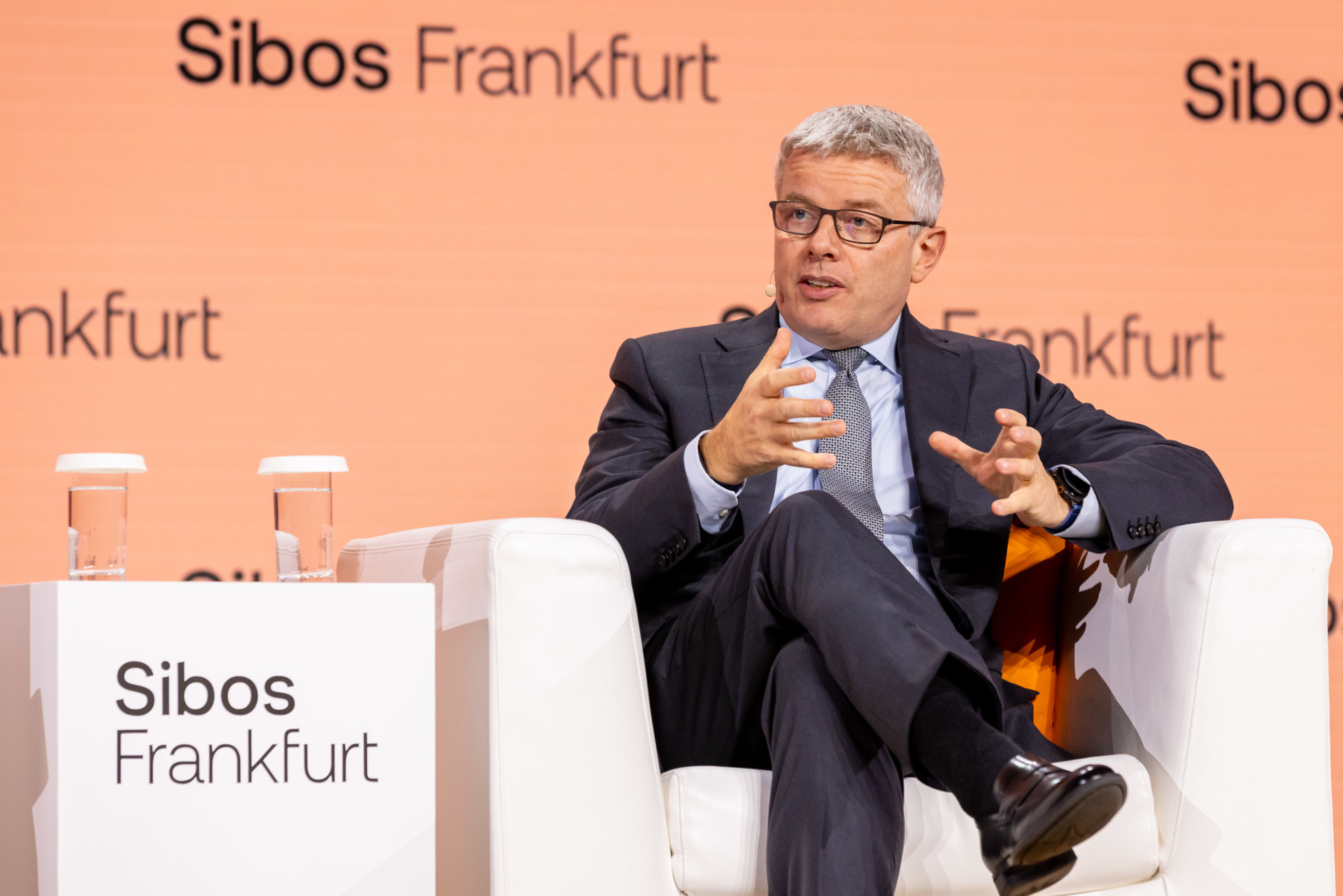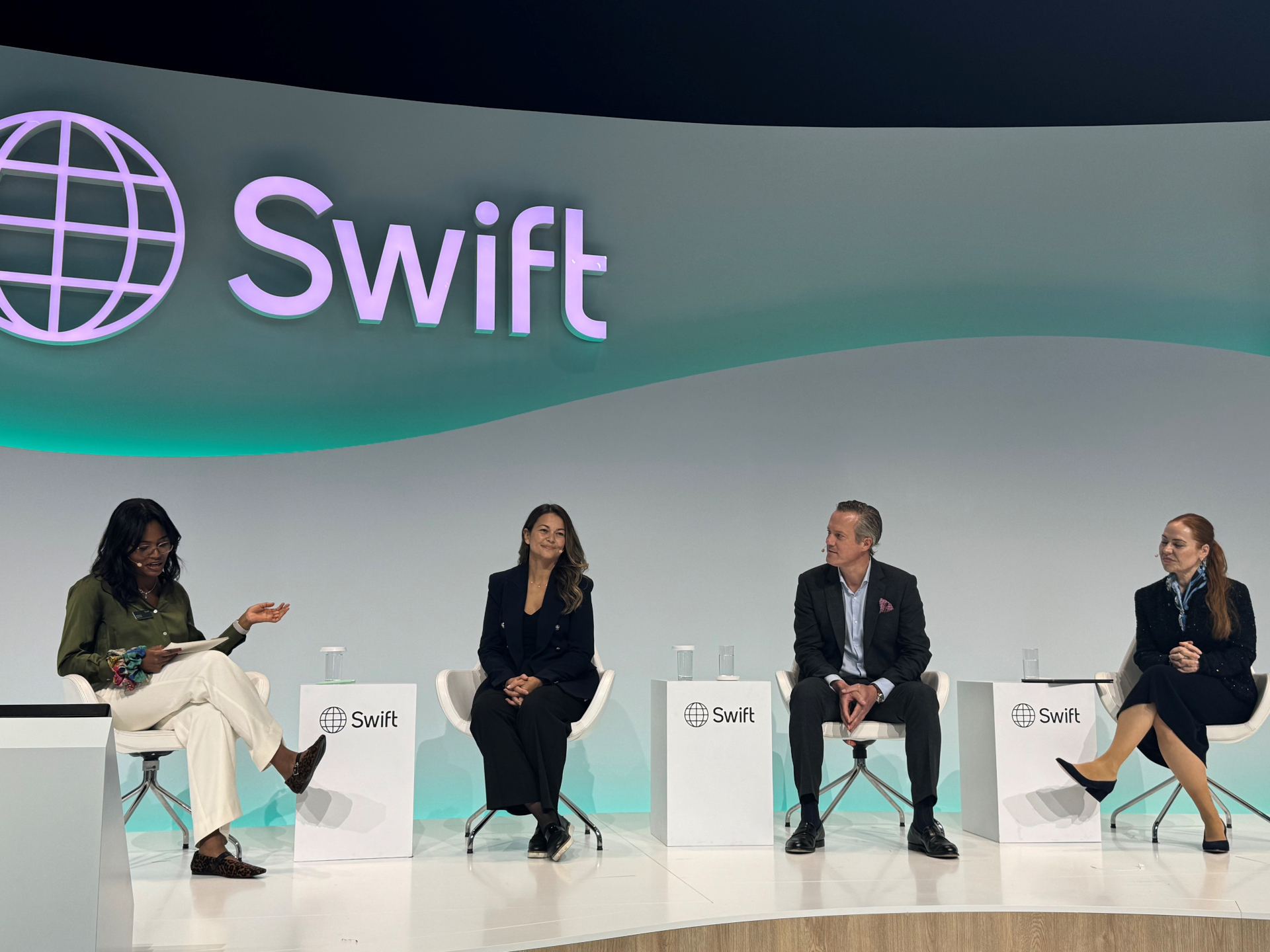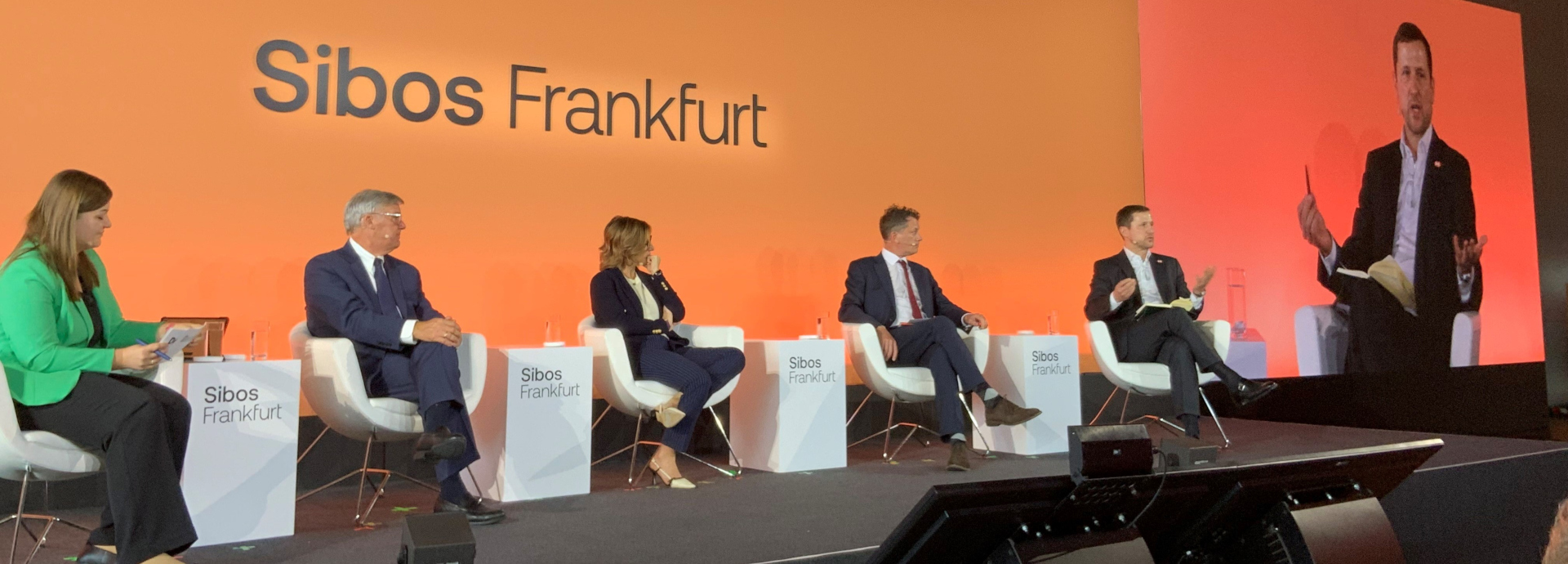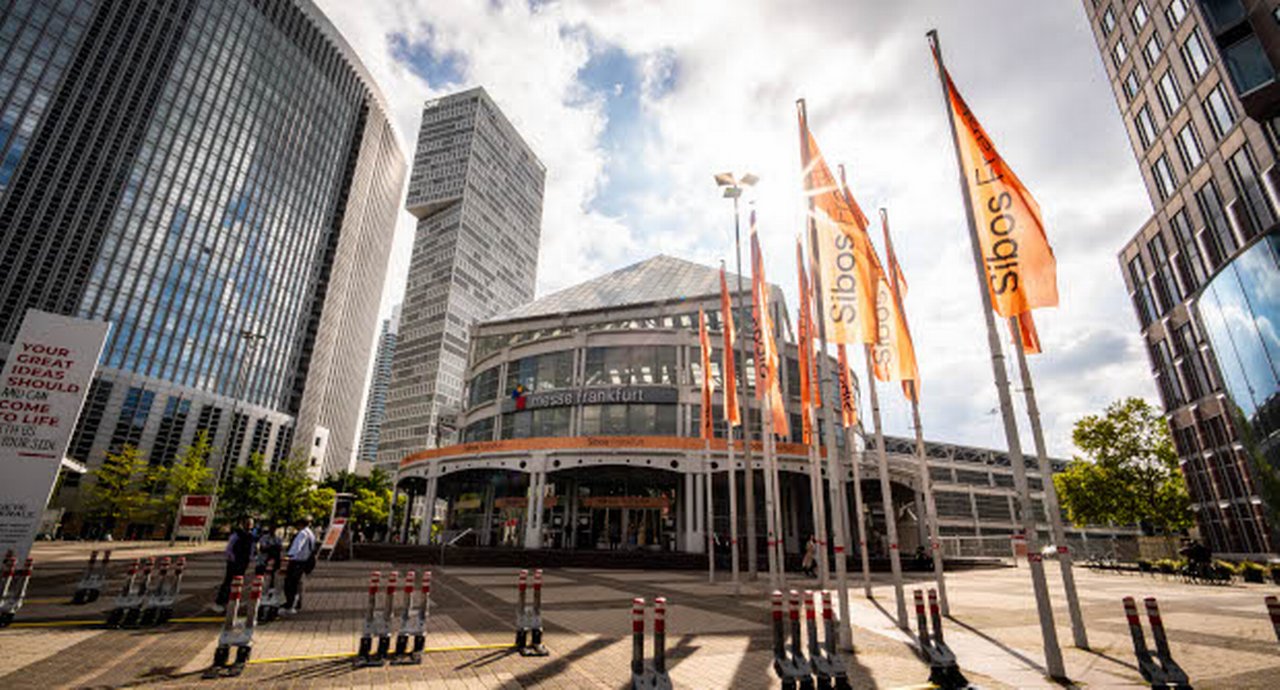19 November 2025
At Sibos Frankfurt 2025 improving Europe’s competitiveness in the face of rerouted supply chains and geopolitical shocks was a dominant theme in conference panel sessions. flow reports on ‘where next’ in the last of our post-event articles, and analyses how technology is helping
MINUTES min read
With Sibos 2025 hosted by Frankfurt, Germany’s financial centre, it fell to Deutsche Bank CEO Christian Sewing in the opening plenary address to remind the 12,500 delegates that descended on the city of what Europe has to do to regain its competitiveness.
Europe is a continent of immense potential – defined by world-class enterprises, deep research capabilities and a tradition of stability and open markets. But years of sluggish growth, excessive bureaucracy and underinvestment have left their mark, he argued. To regain momentum, said Sewing, Europe must channel its values into action: tackling overdue structural reforms, revitalising its capital markets and unlocking large-scale private investment in future-critical areas such as green technology, AI and defence.
Tackling Europe’s competitiveness
“Banks are called upon to actively shape the renewal of Europe’s economy,” Sewing declared. “If we make the right decisions now, we can become the driving force behind a new era of growth – for Germany, for Europe, and for the global economy.”
This wake-up call was carried into the Inside Leadership session on the second day of Sibos (30 September) featuring Fabrizio Campelli, Head of Deutsche Bank’s Corporate Bank and Investment Bank, in a Fireside Chat with Dr Rebecca Harding, CEO at the Centre for Economic Security, to continue the analysis of how Europe can kick-start its recovery.
Harding highlighted the problem Europe has: there have been so many competitiveness reports since the creation of the Single Market and the landmark Cecchini Report in 1988, which looked to quantify the economic benefits of a European Single Market.1 Successive studies, she noted, have seemingly reached the same conclusion: Europe must boost innovation, deepen its capital markets and close the gap with the US. The key question, she asked, is what makes this moment different.
For Campelli, there is a real difference now. Europe’s competitiveness challenge has become structural – and urgent. “Despite the reports and multiple efforts, we still have a gap,” he said. “Energy costs are too high, labour shortages persist, supply chains remain fragile, and regulation is over-abundant and complex. All of these factors combine to create an environment in which Europe is struggling to connect with its competitiveness opportunity.”

Fabrizio Campelli, Head of Deutsche Bank’s Corporate Bank and Investment Bank during the ‘Inside Leadership’ session
Europe’s export-heavy economy – with trade representing about 20% of total value add, double that of the US – makes it especially exposed to “an environment where trade wars and tariffs are creating weaknesses”. An appreciating euro compounds the strain.
The Draghi Report on EU Competitiveness – the most recent study on European competitiveness, published in September 2024 – added vital perspective on how Europe’s current predicament took shape, Campelli argued.2 “The Draghi Report highlighted how the policy shifts since the global financial crisis – and especially since the sovereign crisis in 2012 – have made things worse, not better,” he explained. “There was a heavy focus on external competitiveness toward trade partners, which meant a focus on wage control, rather than productivity enhancement and innovation within the 27 countries of the bloc.”
That approach, he warned, had unintended consequences. “By trying to be more competitive on price through wage control, you create tension. You don’t achieve innovation or research and development shifts into new sectors. You also potentially create issues with populism, as people feel their purchasing power isn’t improving.”
“Banks and capital markets must work together to crowd in private capital”
Campelli identified three levers that could restore competitiveness: energy; innovation; and the single market. Europe imports energy equivalent to 2.1% of GDP, while natural gas remains “15 times more expensive than in the US”. Productivity and innovation have also faltered: “60% more patents are filed in the US, seven times more unicorns are created, and ten times more venture capital is available,” while Europe’s greatest strength – its single market – is “fragmented; it doesn’t trade enough with itself,” he reflected.
Looking ahead, Campelli highlighted the need to mobilise public and private investment. “The energy transition, infrastructure, and defence will attract large sums of public funding,” he said, “but banks and capital markets must work together to crowd in private capital.” The conclusion was quite clear – we have to stop “admiring the problem” and banks are critical to an effective solution.
Energy transition
Energy transition is critical to the competitiveness and the flexibility challenges that Europe faces. The session, ‘Building a sustainable future: How are ESG strategies being implemented across the financial community?’ highlighted the Swift ESG strategy series that began at Sibos Toronto 2023 with the imperative now to turn strategy into action.
Deutsche Bank’s Lavinia Bauerochse was clear on how this should be funded. “We are there to mobilise private capital – because not all the funding needed to close the financing gap can come through bank balance sheets alone,” she explained. Sustainable finance is in an evolution from focusing on ‘green’ projects towards supporting clients – particularly in hard-to-abate sectors – by providing transition finance.
This isn’t quick: “It will take investments into grid stability, energy storage, and energy security to foster competitiveness and attract new industries like data centres or AI capacities,” she added. But combining finance strategically with the need to transition will set the right path.

‘How are ESG strategies being implemented across the financial community?’ Left to right: Katherine Barrow, Global Head of Environment, Swift; Elena Philipova Director, Sustainable Finance LSEG; Wolfgang Vitzthum, Managing Director, Sustainable & Transition Finance Advisory, Commerzbank AG; and Lavinia Bauerochse, Global Head of Sustainable Finance Corporate Bank, Deutsche Bank
Fragile supply chains
Energy is just one transition challenge, however, and in a context of “extremely fragile” supply chains in Europe, resilience is a key determinant of competitiveness. This was the focus of the panel, ‘Developing resilient supply chains in a fragmented world’ on 29 September. Panellists agreed that Europe had “gone through a lot” in the wake of shocks such as the Covid-19 pandemic, the Russia/Ukraine conflict and the new climate of tariffs. “Geopolitics and trade policy are by far the number one issue” for anyone in procurement, supply chains and treasury, they reflected.
These are not new issues as such but have become more acute as the world of trade has fragmented. The discussion was moderated by BCG Senior Partner Sukand Ramachandran who had been part of the group behind the publication, Great Powers, Geopolitics and the Future of Trade on 13 January 2025.3
This was a global panel and while the resilience of European supply chains increasingly need to take into account the complexities of geopolitical and geoeconomic tensions between nations, for the Bank of China’s transaction banking Deputy General Manager Yunfei Liu, the issue was more to do with the role that financial services play in supporting SMEs. In 2019 she pointed out that “banks have been wary of lending to smaller companies because default rates are higher on average”.4 Six years later her view was that Chinese SMEs could not respond to geopolitics by redirecting exports and looking for new overseas markets. Rather, they are forced to look to domestic consumption. Digitalising of trade and trade finance were increasingly part of a solution rather than the main solution – SMEs were also facing transportation and logistics issues as well.
For James Fraser, Global Head of Trade & Working Capital and Head of EMEA Payments at J.P. Morgan, the challenge for SMEs was the key problem in supply chain resilience. Large corporates are able to access finance, transport and logistics that are essential to global trade. But second and third-tier suppliers are the ones “bearing the burden of these exponential shifts in demand”. As Fraser noted: “They’re not as well-banked and capitalised for it and it’s where we tend to see clients asking us to help with their supply chains.”
Moving forward with trade digitisation
Nevertheless, Fraser’s point that “you have to get to that standardisation where we can all consume the same structured data” was a fitting prelude to the panel discussion, ‘Interoperability and digitisation in trade: The path to adoption’ that took place on the last day.
Chris Southworth, Secretary General of ICC United Kingdom observed, “The world is covered in trade corridors like a country is covered in roads. You wouldn’t upgrade every road at the same time – that would be absurd. You go for the trunk roads first – making them smart, digital and modern.” In global trade, those trunk routes are the Maritime Silk Road (Europe–Gulf–Asia–China) and the transatlantic corridor between Europe and the US.
Even so, the challenge lies not in the technology itself but in the scale of adoption according to Kai Fehr, Global Head of Industry Groups and Partnerships, Global Trade Solutions at HSBC. Banks, he said, face pressure on budgets and must balance investments in new systems against existing operational priorities. Convincing clients to change established processes is often harder still, especially given the complexity of cross-border regulation and the diversity of markets and players involved.
For Southworth the ambition should nevertheless be to aim for at least one corridor to be fully interoperable: “Along those routes are six global trade-finance and logistics hubs – all with sophisticated infrastructure – but none interoperating. If we focus on those hubs and connect them, we get interoperability at real scale. All we need is one. As a policymaker, I can say – you need a precedent. Once you’ve got it, the whole system starts moving.”

Pictured, left to right: Agnes Checinski (Deloitte), John Monaghan (Premium Technology Inc.), Francesca Nenci (UniCredit), Chris Southworth (ICC United Kingdom), and Kai Fehr (HSBC)
AI in action
Artificial intelligence (AI) is reshaping industries at a pace few could have imagined – from healthcare and manufacturing to financial services. What began as isolated experiments has quickly evolved into enterprise-wide transformation, as firms move from testing to deploying live, commercially valuable applications.
Much of Sibos focused on the huge potential that it offers, and while there are uncertainties around its implementation, according to Joanne Hannaford, CIO and CPO, Corporate Bank at Deutsche Bank, the shift in just a year has been dramatic. “Where we were a year ago with AI, and where we are now, is drastically different,” she noted. “We now have live AI use cases running every day that are adding real commercial benefits to our business.”
To some extent this is intrinsic to the nature of AI and the challenge of adaptation and agility that underpinned the competitiveness agenda set by Christian Sewing. Data and information are key to all of this and Hannaford pointed to the power of combining structured and unstructured data in real time. “When we wanted to understand the impact of potential tariff changes on our clients, we combined our data with live simulations and reached out to them in real time – something we simply couldn’t have done without AI.”
Global trade digitalisation may benefit enormously as a result. During the ‘From fragmented to structured: Building one digital language for global trade’ panel, Lucy Li, Managing Director, Industry Advisory at Microsoft, described how generative AI can extract, structure and validate trade documents such as letters of credit, invoices and packing lists in seconds, achieving far greater accuracy than traditional optimised character recognition.
To demonstrate how this could work in practice, the International Chamber of Commerce (ICC) digital standards initiative (DSI), Microsoft and a consortium of banks explored how an agentic AI-driven connector could facilitate automated data exchanges between ERP systems and trade documents such as letter of credit and bill of lading, even when these documents contained a variety of different data standards as is frequently the case.
Using ICC’s Key Trade Documents and Data Elements framework the connector could automate bank processing of trade documents with a target of 95-99% reduction in employee time, thus freeing capacity to support additional financing.5
Pamela Mar, Managing Director of the ICC’s DSI, said that even while DSI advocates for the adoption of globally interoperable data standards, in the longer-term tools like AI-driven universal connectors can play key roles to enable data to flow seamlessly and securely across platforms and systems. “The task now is to make interoperability a reality so that every enterprise, large or small, can participate in global trade on equal terms,” she said.
Financial enablers
Sibos demonstrated how the financial services sector is changing and the way in which it can support and enable competitiveness, adaptability and flexibility in supply chains around the world – as well as in Europe.
This is about supply chain resilience, digital trade, and how we adapt to the challenges of paradigm-shifting technologies such as AI in addition to an orderly energy transition to ensure climate security. Banks, and trade banks in particular, are a central part of all of this and, as was clear from this year’s event, open for business to facilitate that process.
Sibos Frankfurt 2025 was held at the Frankfurt Messe, Frankfurt, Germany from 29 September to 2 October 2025
Conference images © Swift
Sources
1 See europarl.europa.eu
2 See commission.europa.eu
3 See bcg.com
4 See "Many rivers to cross" at flow.db.com
5 See tradetreasurypayments.com



